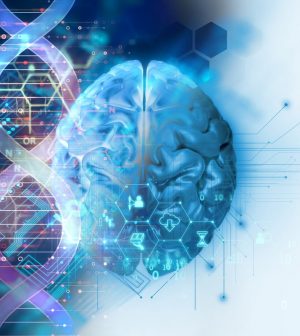- Could Your Grocery Store Meat Be Causing Recurring UTIs?
- Are You Making This Expensive Thermostat Error This Winter?
- Recognizing the Signs of Hypothyroidism
- 10 Strategies to Overcome Insomnia
- Could Artificial Sweeteners Be Aging the Brain Faster?
- Techniques for Soothing Your Nervous System
- Does the Water in Your House Smell Funny? Here’s Why
- Can a Daily Dose of Apple Cider Vinegar Actually Aid Weight Loss?
- 6 Health Beverages That Can Actually Spike Your Blood Sugar
- Treatment Options for Social Anxiety Disorder
Scientists Spot Gene Behind Form of Intellectual Disability Affecting Thousands Worldwide

MONDAY, June 3, 2024 — Mutations in a single newly identified gene are responsible for developmental disorders affecting tens of thousands of people worldwide, a new study claims.
The gene – RNU4-2 – can cause a collection of developmental symptoms that had not previously been tied to a distinct genetic disorder, researchers report.
The discovery is significant because it represents one of the most common single-gene genetic causes of such disorders, ranking second only to a movement disorder called Rett syndrome, researchers said.
“Nowadays, finding a single gene that harbors genetic variants responsible for tens of thousands of patients with a rare disease is exceptionally unusual,” said lead researcher Daniel Greene, an assistant professor of genetics and genomics sciences at the Icahn School of Medicine at Mount Sinai in New York City. “Our discovery eluded researchers for years due to various sequencing and analytical challenges.”
More than 99% of genes known to harbor mutations that cause developmental disorders produce proteins through a process called encoding.
These disorders cause developmental delays that affect a person’s social, academic or occupational function, researchers said. They also cause intellectual delays that limit a person’s learning, reasoning and problem-solving skills.
Researchers figured that they might be overlooking some genetic causes of developmental disorder because non-coding genes that don’t produce proteins were being overlooked.
RNU4-2 is a non-coding gene, and researchers discovered it after using a U.K. genetics library to analyze over 41,000 non-coding genes in more than 5,500 people with intellectual disability and about 46,400 healthy people.
The new study appears in the journal Nature Medicine.
“What I found remarkable is how such a common cause of a neurodevelopmental disorder has been missed in the field because we’ve been focusing on coding genes,” Dr. Heather Mefford, a researcher with the Center for Pediatric Neurological Disease Research at St. Jude Children’s Research Hospital, said in a news release. Mefford was not involved with the research.
“This study’s discovery of mutations in non-coding genes, especially RNU4-2, highlights a significant and previously overlooked cause,” Mefford continued. “It underscores the need to look beyond coding regions, which could reveal many other genetic causes, opening new diagnostic possibilities and research opportunities.”
RNU4-2 is a very short gene, “but this gene plays a crucial role in a basic biological function of cells, called gene splicing, which is present in all animals, plants and fungi,” said senior researcher Ernest Turro, an associate professor of genetics and genomic sciences at Icahn Mount Sinai.
“Most people with a neurodevelopmental disorder do not receive a molecular diagnosis following genetic testing,” Turro said in a Mount Sinai news release. “Thanks to this study, tens of thousands of families will now be able to obtain a molecular diagnosis for their affected family members, bringing many diagnostic odysseys to a close.”
More information
The U.S. Centers for Disease Control and Prevention has more about developmental disability.
SOURCE: Icahn School of Medicine at Mount Sinai, news release, May 31, 2024
Copyright © 2026 HealthDay. All rights reserved.










